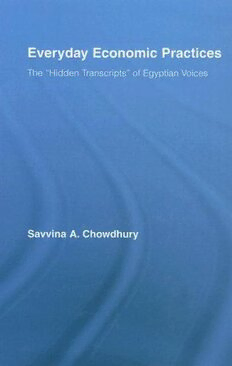
Everyday Economic Practices: The 'Hidden Transcripts' of Egyptian Voices (New Political Economy) PDF
193 Pages·2007·0.947 MB·English
Most books are stored in the elastic cloud where traffic is expensive. For this reason, we have a limit on daily download.
Preview Everyday Economic Practices: The 'Hidden Transcripts' of Egyptian Voices (New Political Economy)
Description:
This book brings to the forefront the significance of local everyday economic practices to development policymaking. Chowdhury's objective in unearthing these diverse activities is two-fold. She demonstrates why it is a misrepresentation to characterize all that is economic as "capitalism". Additionally, she contends that in those instances of rupture where local economic practices break into dominant narratives of the economy, we catch a glimpse of what James Scott has referred to as the "hidden transcripts" of alternative epistemologies. Chowdhury argues that the normative content of these other epistemological frameworks provide us with alternative ways to conceptualize economic development as something other than industrialization, urbanization and environmental degradation as experienced by the West.
See more
The list of books you might like
Most books are stored in the elastic cloud where traffic is expensive. For this reason, we have a limit on daily download.
